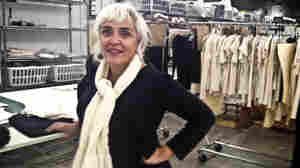After a stint on Capitol Hill, NPR National Correspondent Debbie Elliott is back covering her native South.
From a giant sinkhole swallowing up a bayou community in Louisiana to new state restrictions on abortion providers, Elliott keeps track of the region's news. She also reports on cultural treasures such as an historic church in need of preservation in Helena, Arkansas; the magical House of Dance and Feathers in New Orleans' lower 9th ward; and the hidden-away Coon Dog Cemetery in north Alabama.
She's looking back at the legacy of landmark civil rights events, and following the legal battles between states and the federal government over immigration enforcement, healthcare, and voting rights.
Her coverage of the BP oil spill has focused on the human impact of the spill, the complex litigation to determine responsibility for the disaster, and how the region is recovering. She launched the series, "The Disappearing Coast," which examines the history and culture of south Louisiana, the state's complicated relationship with the oil and gas industry, and the oil spill's lasting impact on a fragile coastline.
Debbie has reported on the new entrepreneurial boom in post-Katrina New Orleans, as well as that city's decades-long struggle with violent crime, and a broken criminal justice system. She's examined the obesity epidemic in Mississippi, and a ground-breaking prisoner meditation program at Alabama's toughest lockup. She's taken NPR listeners on a musical tour of Memphis in a pink Cadillac, and profiled writers and musicians including Aaron Neville, Sandra Boynton, and Trombone Shorty.
Look for Debbie's signature political coverage as well. She's watching vulnerable Congressional seats and tracking southern politicians who have higher political aspirations. She was part of NPR's election team in 2008 and 2112 — reporting live from the floor of the political conventions, following the Presidential campaigns around the country, and giving voice to voters making their choice.
During her tenure in Washington, DC, Debbie covered Congress and hosted NPR's All Things Considered on the weekends. In that role she interviewed a variety of luminaries and world leaders, including Archbishop Desmond Tutu and Liberian President Ellen Johnson Sirleaf. She celebrated the 40th Anniversary of "Alice's Restaurant" with Arlo Guthrie, and mixed it up on the rink with the Baltimore's Charm City Roller Girls. She profiled the late historian John Hope Franklin and the children's book author Eric Carle.
Since joining NPR in 1995, Debbie has covered the re-opening of civil-rights-era murder cases, the legal battle over displaying the Ten Commandments in courthouses, the Elian Gonzales custody dispute from Miami, and a number of major hurricanes, from Andrew to Katrina. Debbie was stationed in Tallahassee, Florida, for election night in 2000, and was one of the first national reporters on the scene for the contentious presidential election contest that followed. She has covered landmark smoker lawsuits, the tobacco settlement with states, the latest trends in youth smoking and electronic cigarettes, and tobacco-control policy and regulation. NPR has sent her to cover a Super Bowl, the Summer Olympics, Bama football fans, and baseball spring training.
Debbie Elliott was born in Atlanta, grew up in the Memphis area, and is a graduate of the University of Alabama College of Communication. She's the former news director of member station WUAL (now Alabama Public Radio).












